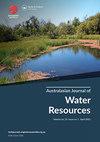澳大利亚偏远土著社区的安全饮水和卫生设施:实现可持续成果的条件
IF 2.2
Q2 WATER RESOURCES
引用次数: 3
摘要
摘要安全饮用水和有效的卫生设施是一项基本人权。这些基本服务可以支持或损害生活在偏远澳大利亚传统乡村的原住民和托雷斯海峡岛民的健康。尽管全球和澳大利亚对可持续发展目标作出了承诺,但水和环境卫生服务水平经常被认为是不可靠、不安全的,而且标准低于非土著和非偏远定居点。这项研究旨在确定在澳大利亚偏远土著社区持续提供安全饮用水和卫生设施的最佳条件。通过结合文献综述、对关键利益相关者群体的访谈和应用研究结果,确定了改善水和卫生成果的关键条件。其中包括适用于目的、人员和地点的水和卫生技术;对当地土著服务运营商的能力建设、培训和持续支持;所有参与交付的人员都需要具备一定程度的当地和土著文化能力。这些发现旨在为土著社区更可持续的水和卫生成果提供信息。本文章由计算机程序翻译,如有差异,请以英文原文为准。
Safe water and sanitation in remote Indigenous communities in Australia: conditions towards sustainable outcomes
ABSTRACT Safe drinking water and effective sanitation is a basic human right. The health of Aboriginal and Torres Strait Islander Peoples living on traditional Country in remote Australia can be supported or undermined by these essential services. Despite global and Australian commitments to the Sustainable Development Goals, water and sanitation service levels have regularly been identified as unreliable, unsafe, and of a lower standard than non-Indigenous and non-remote settlements. This research sought to identify the optimal conditions to enable consistent delivery of safe water and sanitation in remote Indigenous communities of Australia. Using a combination of literature reviews, interviews with key stakeholder groups and applied research findings, key conditions for improved water and sanitation outcomes were identified. These included technology for water and sanitation that is fit for purpose, people and place; capacity-building, training and ongoing support for local Indigenous service operators; and that all personnel involved in delivery require a level of cultural competency to the local and Indigenous context. These findings are intended to contribute to informing more sustainable water and sanitation outcomes in Indigenous communities.
求助全文
通过发布文献求助,成功后即可免费获取论文全文。
去求助
来源期刊

Australasian Journal of Water Resources
WATER RESOURCES-
CiteScore
5.10
自引率
21.90%
发文量
25
期刊介绍:
The Australasian Journal of Water Resources ( AJWR) is a multi-disciplinary regional journal dedicated to scholarship, professional practice and discussion on water resources planning, management and policy. Its primary geographic focus is on Australia, New Zealand and the Pacific Islands. Papers from outside this region will also be welcomed if they contribute to an understanding of water resources issues in the region. Such contributions could be due to innovations applicable to the Australasian water community, or where clear linkages between studies in other parts of the world are linked to important issues or water planning, management, development and policy challenges in Australasia. These could include papers on global issues where Australasian impacts are clearly identified.
 求助内容:
求助内容: 应助结果提醒方式:
应助结果提醒方式:


